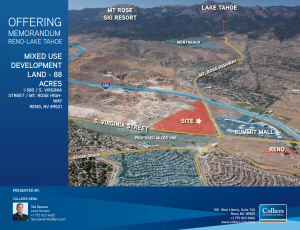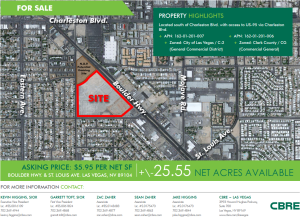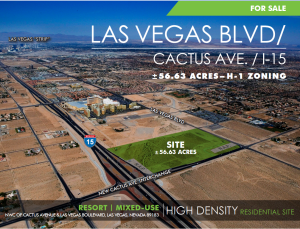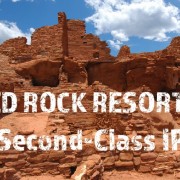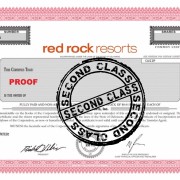Why is Station Casinos Selling Valuable Casino Sites?
See also: More growth questions about the Las Vegas locals gaming market.
In Red Rock Resorts’ most recent S-1/A, the company says it “control[s] approximately 398 acres of developable land comprised of seven strategically-located parcels in Las Vegas and Reno, Nevada, each of which is zoned for casino gaming and other commercial uses” (3/15/16 S-1/A, p. 116). The filing then lists seven such parcels: Durango/I-115 (70 acres), Wild Wild West/Viva (96 acres), Flamingo/I-215 (58 acres), Via Inspirada/Bicentennial Parkway (45 acres), Boulder Highway (30 acres), Mt. Rose Property (Reno) (88 acres), and South Virginia St/I-580 (Reno) (8 acres).
Two of these sites caught our eye, because they are actually on the market. There is no guarantee that IPO investors will be able to participate in any potential growth tied to these parcels, if they are soon sold off.
The large Mt. Rose site in Reno has been on the market since at least November 3 last year, less than a month after the company made its initial IPO filing on Oct 13.
A 25.5-acre portion of the company’s 30-acre Boulder Highway site in Las Vegas has also been on the market for a while. The parcel for sale is not itself entitled for gaming development, leaving a 5-acre rump for a future casino. The earliest listing we saw was from October 28.
It is unclear why Red Rock does not disclose in its prospectus that these two parcels are currently listed for sale. This lack of disclosure is all the more puzzling given that the company does say that another gaming-entitled parcel in its land bank is for sale – immediately after it lists off the seven parcels mentioned above: “We also own an additional development site in Las Vegas that is zoned for casino gaming and other commercial uses and which is currently for sale.”
This likely refers to what one might call the “Cactus/I-15 site”, which is located off the new Cactus Avenue ramp of I-15 south of the Las Vegas Strip. This parcel has also been on the market since at least October 28, and it is being sold “with a deed restriction precluding any gaming on entire site.” (Station Casinos had announced a “Cactus Station” project at this location back in November, 2008, before the highway exchange was built.)
Gaming-entitled land has been a scarce commodity since Nevada State Senate Bill 208 (“SB 208”) was enacted in 1997 to significantly limit the construction in large urban communities such as Las Vegas/Clark County and Reno/Washoe County. As Red Rock tells prospectus investors, one example of the ability of its “highly-experienced management team, led by the Fertitta family,” to create value has been their “capitalizing on the opportunity created by Nevada’s passage of SB 208 through a series of strategic acquisitions and new developments” (S-1/A, 3/15/16, p. 4). Furthermore, the company believes that “the development of new casino facilities will continue to be limited due to SB 208, which limited casino gaming in the Las Vegas valley to specified gaming districts and established more restrictive criteria for the creation of new gaming districts” (S-1/A, 3/15/16, p. 8). One would thus expect any large, gaming-entitled parcels – such as the ones the company has put on the market – to continue to be quite valuable.
Investors should ask Red Rock Resorts/Station Casinos and its IPO underwriters:
- Why is the company selling valuable casino sites?
- Where will growth come from if the company is selling off future casino sites?
- Does the Fertitta-led management team not see value in these parcels?
- Do they not see growth opportunities that can be realized by developing these sites?
- Do the Fertittas and other executives of Red Rock have confidence in the company’s core Las Vegas locals business?
See more of our analysis of the Red Rock Resorts/Station Casinos IPO:
- Download our unauthorized roadshow presentation, “Red Rock Resorts: A Second-Class IPO” here.
- The insiders are cashing out at a high price compared to the company’s estimated equity.
- Growth concerns in the company’s primary Las Vegas locals market and the lack of new development agreements in the tribal gaming market.
- The tax receivable agreement could drain substantial amount of cash out of the company and affect free cash flow.
- The dual-class structure will make public investors second-class shareholders.
- The lack of disclosure regarding the regulatory problems of Deutsche Bank, a 25% current owner.


